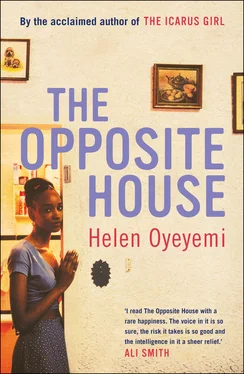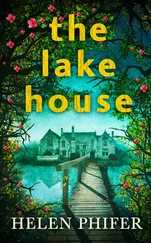Helen Oyeyemi - The Opposite House
Здесь есть возможность читать онлайн «Helen Oyeyemi - The Opposite House» весь текст электронной книги совершенно бесплатно (целиком полную версию без сокращений). В некоторых случаях можно слушать аудио, скачать через торрент в формате fb2 и присутствует краткое содержание. Год выпуска: 2008, Издательство: Bloomsbury UK, Жанр: Современная проза, на английском языке. Описание произведения, (предисловие) а так же отзывы посетителей доступны на портале библиотеки ЛибКат.
- Название:The Opposite House
- Автор:
- Издательство:Bloomsbury UK
- Жанр:
- Год:2008
- ISBN:нет данных
- Рейтинг книги:4 / 5. Голосов: 1
-
Избранное:Добавить в избранное
- Отзывы:
-
Ваша оценка:
- 80
- 1
- 2
- 3
- 4
- 5
The Opposite House: краткое содержание, описание и аннотация
Предлагаем к чтению аннотацию, описание, краткое содержание или предисловие (зависит от того, что написал сам автор книги «The Opposite House»). Если вы не нашли необходимую информацию о книге — напишите в комментариях, мы постараемся отыскать её.
The Opposite House — читать онлайн бесплатно полную книгу (весь текст) целиком
Ниже представлен текст книги, разбитый по страницам. Система сохранения места последней прочитанной страницы, позволяет с удобством читать онлайн бесплатно книгу «The Opposite House», без необходимости каждый раз заново искать на чём Вы остановились. Поставьте закладку, и сможете в любой момент перейти на страницу, на которой закончили чтение.
Интервал:
Закладка:
When I told Chabella, she left her wooden spoon in the stew she was stirring, closed her eyes tight and asked me in a near whisper, ‘Are you gay as well?’
‘I don’t think so, Chabella.’
‘All right, because don’t think I don’t know that you’ve been kissing as many boys as you can.’
I half-heartedly denied that, but Mami waved me off.
‘I am very sorry to hear that Amy Eleni is gay. Her life will be harder than yours, you know.’
Chabella gave me a topsy-turvy stone amulet on a piece of clean rope and told me to give it to Amy Eleni. I did, and Amy Eleni said, coldly, ‘What is this, something to make me straight?’
I told her no. That wasn’t Mami’s style.
‘You’re not going to ask me who my first crush was?’ Amy Eleni asked me. She was playing with Chabella’s amulet. I hastily said, ‘No, no.’ Amy Eleni looked at me then, with a soft, auroral reproach that made my heart flip over and made me ashamed of myself and my arrogance and made me want to promise her something that I couldn’t and made me think that I’d gone down in her estimation — all these things at once.
Mami had not always liked Amy Eleni; when she became the second girl after Dominique that I bothered to bring home for dinner, Mami was tense that entire first evening. The table was quiet whenever Amy Eleni lifted her fork to her mouth, and Chabella leant forward a little, as if she wanted to snatch the food out of Amy Eleni’s jaws, as if she didn’t think Amy Eleni should ever know what a good Cuban stew tasted like. Amy Eleni suspected as much, and to me she seemed more polite than I had ever seen her. Throughout the meal she said ‘Delicious’ in varying tones and volumes. With a grin that admitted that she would listen but not understand, Amy Eleni asked Papi about his work, and she told Tomás all that she could remember about the glory days of WWF wrestling. But when Amy Eleni went home, Chabella stopped me as I was going to bed and said sorrowfully, ‘You’ll learn that the white girl is never your friend. She works to a different system. She only pretends to understand.’
I said, ‘And what about Brigitte?’
Mami said, ‘Brigitte was my teacher. You know that.’
The café is full now; shadow-spotted faces encircle me. I close my eyes, and my Cuba comes, and the band is with me and then it lets me go and I am free.
One morning Mami came downstairs wrapped in nothing but a cloth of preternatural white, with strands of her hair swimming around her face, strands of her hair tied with little flags of white cloth. Strips of soft skin showed here and there, where the cloth gaped and made mouths around her shoulder blades, parted in protest at being trussed so tight around her breasts. Because she was pregnant with Tomás, Tomás became part of the outfit too: it was he that made the cloth coast out in front of her and around her; it was he that made the white flow. Papi got up and ran, actually ran, for a camera. Chabella watched him go, and as Papi passed her he caught her hand and twirled her like a giggling top.
Me, I looked up from my Saturday-morning cartoons and I gaped. I was eight; if I had been older I would have been able to admire Mami. I would have been able to apprehend Mami’s white sheet thing as a ‘look’, the way people assess high-fashion catwalks and shut down their instinct to free so they don’t feel any more how terrifying and elemental the shapes and colours are, the fact that people are walking around with cones on their heads and jewellery like chainmail, rouged violently right up to their foreheads, looking like the devil.
Anyway, my Mami looked wild, wilder than animals. She was not made to live in a house or even on the plains, but in the atmosphere. Chabella turned off the TV; I didn’t object.
‘I used to take classes in folk dance,’ she said, slipping a cassette into the sound system. She rewound it, took it out, fiddled with it, turned it over.
‘Your Abuelo Damason used to complain because they were expensive. But then the dance classes stopped with the Revolution because they were un-Cuban; they were too African. And it’s true; I suppose El Jefe was right to be nervous that something was going on with Santeria. Something is going on. Those West Africans brought another country in with them, a whole other country in their heads. After dance classes stopped, you could only get to see people dance out apataki if you knew the roots people, the ones who didn’t have any money, like dockworkers. They wouldn’t teach me anything. Maybe they knew something about me that I didn’t. It is hard to learn how to be black when people don’t let you.’
Mami pressed ‘play’.
A drumbeat jumped up, collided with another one, and the two chased each other around and around — rhythm. Chabella laughed, gasped, held her belly against Tomás’s kick. ‘He likes that,’ she said, proud. Both of us were shaking our shoulders to the rhythm. Even Papi was stamping as he steadily caught Chabella on film — click, click, click. Inside my head a group of drummers played, swaying in unison with a flourish of hands. Their drums were in their laps, small but with tough heads. The drum talk was threaded through with fast, loud bembe singing, Yoruba patched up with Spanish. I couldn’t understand a word, but I understood that it was a story, and that the way Mami began to dance, she knew which story. Chabella was awkward at first, watching her step, trying to make a pattern, pulling faces as she touched the ground flat-footed and clumsy under the weight of Tomás. But then I saw the song come through her. It came because she didn’t give up. The drums came like
kata-kata-ka
kata-kata-ka
KA-TA
kata-kata-ka
kata-kata-ka
KA-TA
Mami became Yemaya Saramagua, a sure, slow swell in her arms and her hips like water after a long thirst, her arms calling down rain, her hands making secret signs, snatching hearts.
Kata-kata-ka
Kata-kata-ka
KA-TA
Water is an unhappy eye. Alone it lives, wishing it were blind. Look into water; it will look back at you, and it will tremble. Yemaya Saramagua is her father’s eye; she watches the earth for him. Her own eyes, though, are shy. Orisha of water, she could drown the world in a flood if she wanted to, but she has never been in love.
Kata-kata-ka
Oh, now she’s in love!
Kata-kata-ka
She’s in love with Ogun Arere; iron Aguanilli, handsome, strong, so cold that even in the midst of the flame he shrugs his shoulders. She shouldn’t love him, but she can’t help it. Come, come, Ogun Arere, come to your true love. But Ogun rejects her. Still she comes back. He would have to build a mighty dam to keep her love away.
KA-TA
the story went on. Mami stopped knowing that we were even there. Very quietly, Papi sat down.
Once the story had danced itself out, I waited for the goddess to be gone. Then, behind her back, I clapped until my hands hurt. Papi wolf-whistled. I felt winded. It was infinitely better than cartoons.
Mami didn’t dance out apataki again, which made me think that it must have been some kind of Tomás-related thing, like a craving.
Aya’s family is large. Each member of Aya’s family has aspects, and those aspects have aspects. That is why, with only a little pain, the family could afford to separate when there was great need for them to do so. They had to scatter. When it happened, it was not so bad for Aya, as she did not love her aspects:
Yemaya Ataramagwa was never still for a minute; light jumped in her hair and chased her so that she was confusing to look at. And she loved the Ogun river too well, annoying Aya by insisting every day that they two go to play there.
Читать дальшеИнтервал:
Закладка:
Похожие книги на «The Opposite House»
Представляем Вашему вниманию похожие книги на «The Opposite House» списком для выбора. Мы отобрали схожую по названию и смыслу литературу в надежде предоставить читателям больше вариантов отыскать новые, интересные, ещё непрочитанные произведения.
Обсуждение, отзывы о книге «The Opposite House» и просто собственные мнения читателей. Оставьте ваши комментарии, напишите, что Вы думаете о произведении, его смысле или главных героях. Укажите что конкретно понравилось, а что нет, и почему Вы так считаете.












